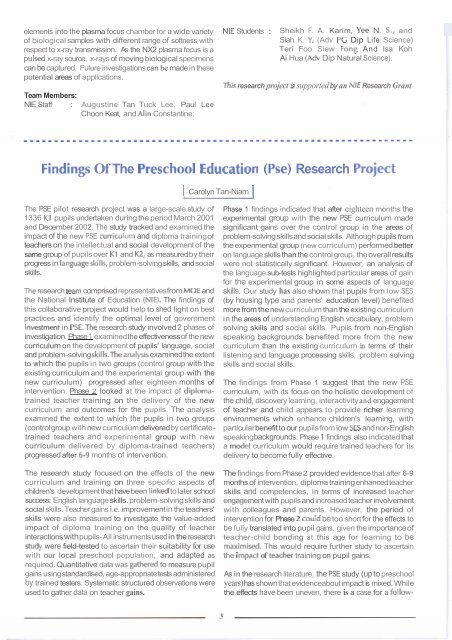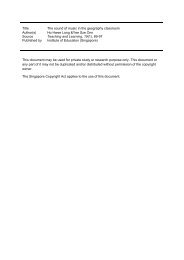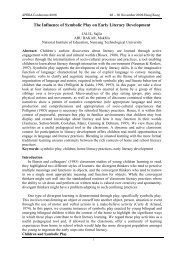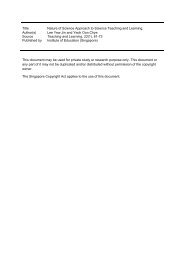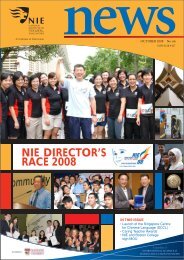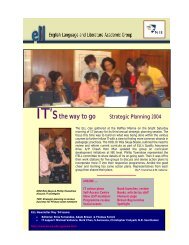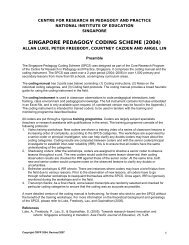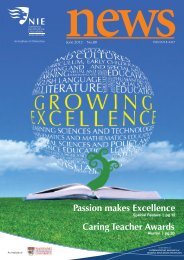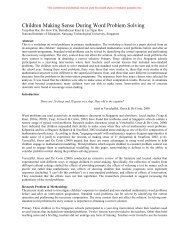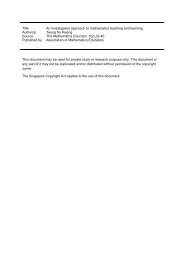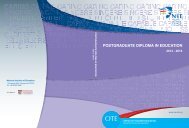Future EBuczttIomI Research: The - NIE Digital Repository - National ...
Future EBuczttIomI Research: The - NIE Digital Repository - National ...
Future EBuczttIomI Research: The - NIE Digital Repository - National ...
You also want an ePaper? Increase the reach of your titles
YUMPU automatically turns print PDFs into web optimized ePapers that Google loves.
elements into the plasma focus chamber for a wide varietyof biological samples with different range of softness withrespect to x-ray transmission. As the NX2 plasma focus is apu [sed x-ray source, x-rays of moving biological specimenscan be captured. <strong>Future</strong> investigationscan be madeinthesepotential areas of applications.Team Members:<strong>NIE</strong> Staff : Augustine Tan Tuck Lee, Paul LeeChoon Keat, and Alin Constantine;N IE Students : Sheikh F. A. Karim, Yee N. S., andSiah K. Y. (Adv PC Dip Life Science)Teri Foo Siew Fong And Isa KohAi Hua (A& Dip Natural Science).This research project is supportedby an <strong>NIE</strong> <strong>Research</strong> GrantFindings Of <strong>The</strong> Preschool Education (Pse) <strong>Research</strong> ProjectCarolyn Tan-Niam I<strong>The</strong> PSE pilot research project was a large-scale study of1336 K1 pupils undertaken during the period March 2001and December 2002. <strong>The</strong> study tracked and examined theimpact of the new PSE curricu[um and diploma trainingofteachers on the intellectual and social development of thesame group of pupils over K1 and K2, as measuredby theirprogress in [anguageskills, problem-solvingskills, andsocialskills.lhe research team comprisedrepresentativesfrom MOE andthe <strong>National</strong> Institute of Education (<strong>NIE</strong>). <strong>The</strong> findings ofthis collaborative project would help to shed light on bestpractices and identify the optimal level of governmentinvatment in PSE.<strong>The</strong> research study involved2 phases ofinvestigation. Phase 1 examinedthe effectivenessof the newcurriculum on the development of pupils' language, socialand problem-solving skilIs.<strong>The</strong>analysis examinedthe extentto which the pupils in two groups (control group with theexisting curriculum and the experimental group with thenew curriculum) progressed after eighteen months ofintervention. Phase 2 looked at the impact of diplomatrainedteacher training on the delivery of the newcurriculum and outcomes for the pupils. <strong>The</strong> analysisexamined he extent to which the pupils in two groups(controlgroup with new curriculumdeliveredby certificatetrainedteachers and experimental group with newcurriculum delivered by diploma-trained teachers)progressed after 6-9 months of intervention.Phase 1 findings indicated that after eighteen months theexperimental group with the new PSE curriculum madesignificant gains over the control group in the areas ofproblem-solvingskillsand social skills. Although pupils fromthe experimental group (new curriculum) performed betteron language skills than the controlgroup, theoverallresultswere not statistically significant. However, an analysis ofthe language sub-tests highlightedparticular areas of gainfor the experimental group in some aspects of languageskills. Our study has also shown that pupils from low SES(by housing type and parents' education level) benefitedmore from thenew curriculum than the existing curriculumin the areas of understanding English vocabulary, problemsolving skills and social skills. Pupils from non-Englishspeaking backgrounds benefited more from the newcurriculum than the existing curriculum in terms of theirlistening and language processing skills, problem solvingskills and social skills.<strong>The</strong> findings from Phase 1 suggest that the new PSEcurriculum, with its focus on the holistic development ofthe chi Id, discovery learning, interactivityand engagementof teacher and child appears to provide richer learningenvironments which enhance children's learning, withparticularbenefit to our pupils from low SES andnon-Englishspeakingbackgrounds. Phase 1 findings also indicatedthata model curriculum would require trained teachers for itsdelivery to become fully effective.<strong>The</strong> research study focused on the effects of the newcurriculum and training on three specific aspects ofchildren's developmentthat havebeen Iinked to later schoolsuccess: English languageskills. problem-solvingskills andsocial skills. Teacher gains i.e. improvementin the teachers'skills were also measured to investigate the value-addedimpact of diploma training on the quality of teacherinteractionswithpupils- All instrumentsused in theresearchstuq were field-tested to ascertain their suitability for usewith our local preschool population, and adapted asrequired. Quantitative data was gathered to measure pupilgains usingstandardised, age-appropriatetests administeredby trained testers. Systematic structured observations wereused to gather data on teacher gains.<strong>The</strong> findings from Phase 2 provided evidencethat after 6-9months of intervention, diploma trainingenhancedteacherskills and competencies, in terms of increased teacherengagementwith pupilsand increasedteacher involvementwith colleagues and parents. However, the period ofintervention for Phase 2 couId be too short for the effects tobe fully translated into pupil gains, given the importanceofteacher-child bonding at this age for learning to bemaximised. This would require further study to ascertainthe impact of tea~her training on pupil gains.As in the research literature, the PSE study (uptopreschoolyears)has shownthatevidenceaboutimpact is mixed. Whilethe effects have been uneven, there is a case for a follow-


